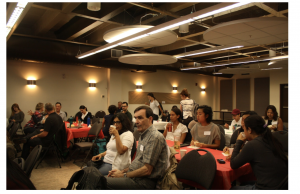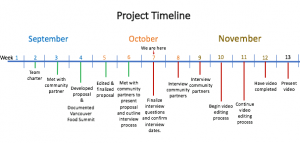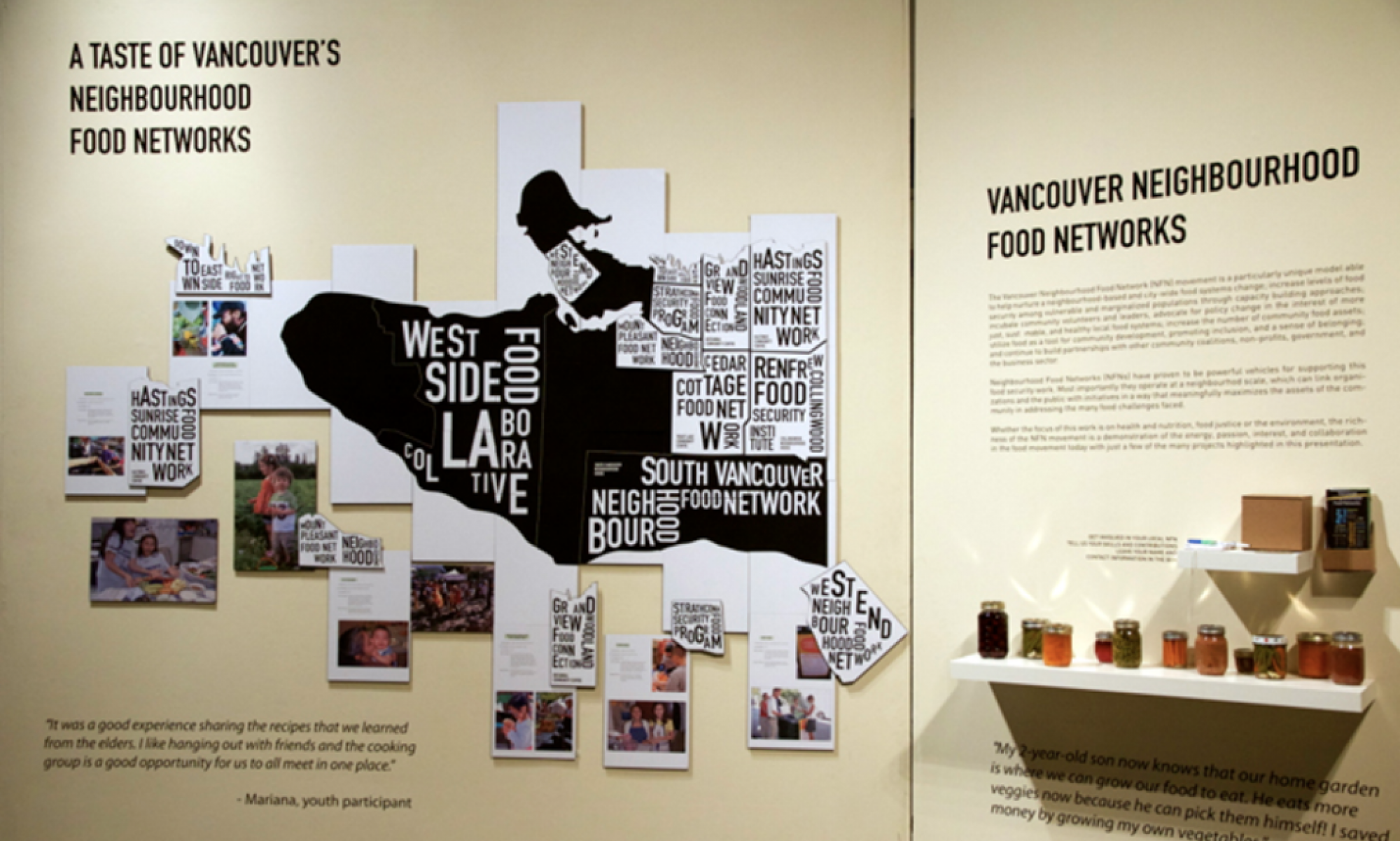As we’re approaching the middle of the term, our community project seems to get clearer and more defined. With our team meetings we have discussed the end result of our project with the key players of the Sustenance Festival, we’re gaining momentum and are headed towards a more concrete video project. Through our proposal, we hope to provide our readers with a detailed overview of this documentation process; including the goals, significance, and objectives of this project as well as the methods used to achieve them. To follow along with our journey in this project, please view the project proposal here.
What?
In week 4-8, after taking to our community partners again, we confirmed the length, structure and purpose of our video.To start collecting clips for the video and having a better understanding of the Sustenance Festival, we pleasantly attended the Vancouver Food Summit at the end of September as an educational opportunity to connect our learning from LFS 350 with the community. The Vancouver Food Summit is an annual event that aims to facilitate conversations between people from a variety of backgrounds to share their experiences and perspectives of food. This year, the Vancouver Food Summit was dedicated to bringing people together, using storytelling and shared dialogue to deepen our collective understanding of the food justice and the diverse cultural food systems that lack recognition in Vancouver’s mainstream food movement. Stephanie, our community partner, shared her experiences of the work she is doing with the Vancouver Park Board to address issues of marginalization to help strengthen the Sustenance festival as a platform for meaningful cross-cultural collaboration. She’s currently in the process of building relationships with diverse community leaders, and during her presentation, she shared some audio recordings of their conversations to highlight of their experiences within the food system in Vancouver. Some of the community leaders she’s been connecting with were also present at the summit and shared some of their challenging experiences in finding meaningful ways to embrace their diverse values of food within Vancouver. The other panelists included members from the Wild Salmon Caravan, Jewish Museum and Archives of BC, Hua Foundation, and UBC’s own Roots on the Roof. The day captured the diverse perspectives of people from different backgrounds and served as a strong learning opportunity for us to deepen our understanding of food justice in Vancouver.

The Vancouver Food Summit, 2017
So what?
Attending the Vancouver Food Summit has definitely helped us to understand the context and bigger picture of this project; while helping us gain additional insights and some background knowledge about the parties who are directly involved in this relationship-building process. Being in the position of a listener helped us to see through the lens of various perspectives, challenging us to step away from our preconceived notions and dominant way of viewing the food system. This is especially important as the perspectives shared often have less room in the public narrative of food. From listening, we were exposed to a different narrative of food based on cultural values that differ from those supported by the dominant food system. This shed light on the integral role food plays in tying one’s identity to their culture.
Dawn Morrison, the Indigenous Leader of the Wild Salmon Caravan, shared with us the indigenous identity tied to ecology and the stewardship of the land, differing immensely from the western production paradigm based on extraction principles. She shared with us the importance of decolonizing our relationship with food, and the need to allow a broader, more conscious connection with the land that is based on a regenerative paradigm. This is especially important as environmental pressures are threatening current production methods and ecological stability on Earth.
When we try to fully understand one’s perspective, we can realize ourselves within the narrative that we ultimately do share. Addressing the injustice within Vancouver’s food system requires us to move beyond transactional cultural understanding and begin balancing the burden of responding. The Vancouver Food Summit provided a safe space to learn from one another, where we can utilize our learning to build a society where we can work together collectively. This may require us to be vulnerable as we address the challenges of our past and the uneven grounds we stand on today. When we seek the knowledge of a deeper understanding, we can move beyond transactional cultural understanding to one that is based on empathy, resilience, and the celebration of our diversity.
Now what?
Our experience from the summit is extremely helpful as we approach the remaining bulk of our assignment in the upcoming weeks. Listening to narratives from representatives at the summit have added a personal touch to this project and inspired us to represent the story of this festival to our best ability, in hopes that it will be a source of encouragement to those involved in this movement while inspiring others to be a part of it. Along with the food summit, having our second meeting with our community partners have prompted us to our next step on the agenda, which includes interview sessions with the core committee members of the Sustenance Festival. We will be documenting these interviews through video which would then be included in our final video product. Our aim for the upcoming week is to brainstorm and craft effective interview questions that will be able to evoke responses to fully capture the essence of this relationship-building process. These interviews will be an imperative part of our project as it will serve as a window for us to understand the vision and expectations of all the committee members involved. It will definitely be an interesting and exciting undertaking as carrying out interviews and video recording is a relatively new experience for most of us in the group. That being said, along with it will certainly come uncertainties and unforeseen challenges. As stated by Tim Harford in his TedTalk, it is useful and important for us to remember that messy situations do not indicate failure. Instead, it can provide us with opportunities to come up with diverse solutions and force us to break out of our comfort zones, which is a process of learning in itself. Having now entered the 6th week of the term, we have certainly had our fair share of uncomfortable experiences that we had to learn from. There were moments in class where we explored certain sensitive topics that were not typically “comfortable” to talk about. However, all these sessions were really eye-opening as they were conducted in an engaging and purposeful approach; it provided us with a safe space to question while giving us the opportunity to listen to a diversity of opinions and learn from the stories of others. We are all really looking forward to what the next few weeks have in store for us!
Weekly Objectives, Achievements, upcoming objectives & strategies.
Achieved Objectives
Week 4:
- Developed proposal
- The proposal is available as a PDF in this blog post
- Attended and documented Vancouver Food Summit on September 27th
- Here we attempted to gain a better understanding of the context with which Sustenance Festival is operating within.
- We rented two video cameras from UBC and filmed all the presentations and panel discussions at the summit.
- Our group, through conversations with attendees and speakers at the summit, were able to explore a diverse range of perspectives on food justice issues.
Week 5:
- Finalized and polished up proposal
Week 6: Flexible learning
- Met with community partner to present proposal and determine interview process
- We met with Brenda Racanelli and Stephanie Lim at the Yaletown Roundhouse Community centre on October 11th. During this meeting we discussed expectations and hopes for the video, as well as probed out some potential interview questions.
- Stephanie and Brenda pitched ideas for themes they would like to see included in the video. They also helped to refine the scope of our project by confirming that our interviews will be only with the organizers of Sustenance festival.
- Brenda opted to help us arrange interviews with the other organizers of Sustenance festival.
- Confirmed interview dates & times with Brenda Racanelli and Stephanie Lim
Upcoming Objectives & Strategies:
Week 7:
- Obtain bios of core committee members involved in planning of Sustenance Videos to assist in writing and polishing interview questions.
- Strategy for achieving: Brenda Racanelli is writing the bios and will be sending them to us in the coming week.
- Write and finalize interview questions by Thursday October 19th to send the core committee members to review before starting interviewing process.
- Strategy for achieving:We have set up a google word doc for all members to edit and brainstorm questions.
- Strategy for achieving: Within our document compile questions and notes from previous community member partner meetings and discuss which questions would be most appropriate and pertinent for each respective interviewee.
- Confirm interview dates with Rebecca, Jason, Ian & Lindsey through email that will be done throughout week 8 & 9 (from October 23 – 31)
- Strategy for achieving:We have already contacted Brenda through email to connect with Jason Hseih, Ian Marcuse & Lindsay Cole who have not been in our community partner meetings, to introduce our project and ask for their availability.
- Strategy for achieving: We will contact Rebecca, who returns on October 24th, through email to ask for her availability and confirm an interview date.
- Rent out cameras for interviews next week
- Strategy for achieving: Shazmeen & Sharon will rent from the Learning Commons.
Week 8: Flexible Learning
- Interview Brenda Racanelli on Monday, October 23 (2-3pm)
- Strategy for achieving: Bring the previously prepared questions and cameras to the interview. Have 2-3 group members conduct the interview.
- Interview Stephanie Lim on Wednesday, October 25 (10 – 11am)
- Strategy for achieving: Bring the previously prepared questions and cameras to the interview. Have 2-3 group members conduct the interview.

References
Harford, Tim. (2015, September). How Messy Problems Can Inspire Creativity [Video file]. Retrieved from https://www.ted.com/talks/tim_harford_how_messy_problems_can_inspire_creativity?language=en.
